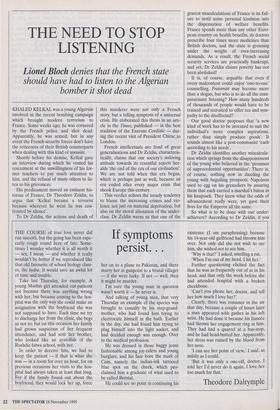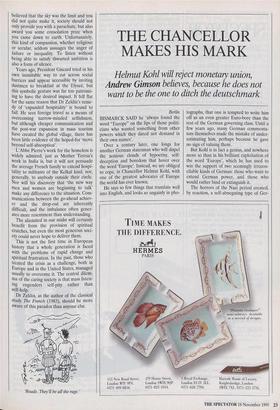THE NEED TO STOP LISTENING
Lionel Bloch denies that the French state
should have had to listen to the Algerian bomber it shot dead
KHALED KELKAL was a young Algerian involved in the recent bombing campaign which brought modern terrorism to France. Some weeks ago, he was cornered by the French police and shot dead. Apparently, he was armed, but in any event the French security forces don't have the reticences of their British counterparts when dealing with this kind of assassin.
Shortly before his demise, Kelkal gave an interview during which he vented his resentment at the unwillingness of his for- mer teachers to pay much attention to him, and the refusal of many others to lis- ten to his grievances.
His predicament moved an eminent his- torian of France, Dr Theodore Zeldin, to argue that `Kelkal became a terrorist because wherever he went he was con- fronted by silence'.
To Dr Zeldin, the actions and death of this murderer were not only a French story, but a telling symptom of a universal crisis. He elaborated this thesis in an arti- cle in the Times, published — in the best tradition of the Entente Cordiale — dur- ing the recent visit of President Chirac, to London.
French intellectuals are fond of great generalisations and Dr Zeldin, characteris- tically, claims that our society's unloving attitude towards its resentful rejects her- alds 'the end of the era of our civilisation'. We are not told when this era began, which is perhaps just as well, because an era ended after every major crisis that shook Europe this century.
This verdict echoes the trendy tendency to blame the increasing crimes and vio- lence not just on material deprivation, but also on the moral alienation of the under- class. Dr Zeldin warns us that one of the gravest miscalculations of France is its fail- ure to instil some personal kindness into the dispensation of welfare benefits. France spends more than any other Euro- pean country on health benefits, its doctors prescribe four times more medicines than British doctors, and the state is groaning under the weight of ever-increasing demands. As a result, the French social security services are practically bankrupt, and yet, Dr Zeldin claims poverty has not been abolished!
It is, of course, arguable that even if every malcontent could enjoy 'one-to-one' counselling, Fraternite may become more than a slogan, but who is to do all the com- passionate listening? How many hundreds of thousands of people would have to be trained and recruited to offer tea and sym- pathy to the disaffected?
Our good doctor proposes that 'a new kind of work has to be invented to suit the individual's more complex aspirations, rather than simply produce goods'. It sounds almost like a post-communist 'each according to his needs'.
Dr Zeldin identifies another miscalcula- tion which springs from the disappointment of the young who believed in the 'promises of unprecedented opportunities'. There is, of course, nothing new in dazzling the young with beguiling prospects. Napoleon used to egg on his grenadiers by assuring them that each carried a marshal's baton in his knapsack. They knew what the odds of advancement really were, yet gave their lives for the Emperor all the same.
So what is to be done with our under- achievers? According to Dr Zeldin, if you believed that the sky was the limit and you did not quite make it, society should not only provide you with a parachute, but also award you some consolation prize when you came down to earth. Unfortunately, this kind of compassion, whether religious or secular, seldom assuages the anger of failure or inequality. To listen without being able to satisfy thwarted ambition is also a form of silence.
Years ago, President Giscard tried in his own inimitable way to cut across social barriers and appear accessible by inviting dustmen to breakfast at the Elysee, but this symbolic gesture was far too patronis- ing to have the desired impact. It fell flat for the same reason that Dr Zeldin's reme- dy of 'expanded hospitality' is bound to fail. He sees foreign travel as a means of overcoming narrow-minded selfishness, but although cheaper communication and the post-war expansion in mass tourism have created the global village, there has been little evidence of the hoped-for 'move beyond self-absorption'.
L'Abbd Pierre's work for the homeless is widely admired, just as Mother Teresa's work in India is, but it will not persuade the average French family to extend hospi- tality to militants of the Kelkal kind, nor, generally, to anybody outside their circle. Nor will his discovery that 'the new way men and women are beginning to talk' make any difference to the situation. Com- munications between the go-ahead achiev- er and the drop-out are inherently difficult, and the imbalance often gener- ates more resentment than understanding.
The alienated in our midst will certainly benefit from the provision of spiritual crutches, but even the most generous soci- ety could never hope to deliver them. This is not the first time in European history that a whole generation is faced with the problems of rapid change and spiritual frustration. In the past, those who treated the crisis as a challenge, both in Europe and in the United States, managed usually to overcome it. The central dilem- ma of the caring society is that mass listen- ing engenders self-pity rather than self-help.
Dr Zeldin, as the author of the classical study The French (1983), should be more aware of this paradox than anyone else.
`Roads. They'll be all the rage.'



















































































 Previous page
Previous page